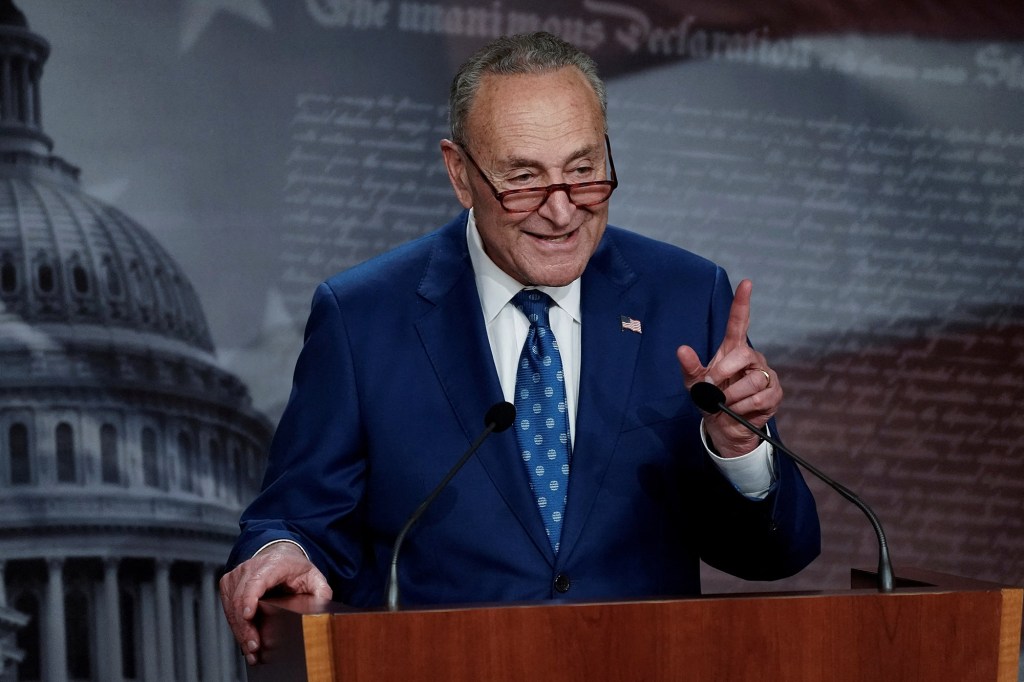Corporations rage at Biden, Democrats over tax hikes
Contact The Author
Big US business groups are blasting a $740 billion legislative package on Capitol Hill that will raise corporate taxes in order to fund the government’s climate and health care initiatives.
The US Chamber of Commerce said that the so-called Inflation Reduction Act, which is poised to be signed into law by President Biden, would saddle businesses with “significant new tax increases and unprecedented government price controls.”
The bill, which passed the Democrat-led Senate over the weekend, includes a minimum 15% tax on corporations that generate more than $1 billion in profits annually based on figures reported in financial statements.
The bill also includes $80 billion for the Internal Revenue Service, which is expected to hire an additional 87,000 agents.
The Joint Committee on Taxation, a nonpartisan watchdog, estimates that between 78% and 90% of the additional $200 billion that the agency will collect as a result of its beefed-up headcount will be collected from small businesses that earn less than $200,000 per year.

The National Association of Manufacturers told Financial Times that the tax increases would deliver “a blow to our industry’s ability to raise wages, hire workers and invest in our communities.”
Another pro-business lobbying group, The Business Roundtable, said that the legislation would add $300 billion in new costs for employers at an inopportune moment when the country faces economic headwinds.
The legislation also imposes a 1% tax on stock buybacks — the result of a compromise agreement between Democratic leadership and Sen. Kyrsten Sinema (D-Ariz.), who struck down an earlier proposal to close the carried interest loophole favored by hedge funds.
The Chamber of Commerce slammed the 1% tax on share buybacks, which will go into effect next year, saying that it would “distort the efficient movement of capital…and diminish the value of Americans’ retirement savings.”
The pharmaceutical industry is also steadfastly opposed to the provision of the bill that would allow the government to negotiate the prices of certain medications for seniors.

“Today’s vote may feel like a political win for Democrats, but it’s really a tragic loss for patients,” said Stephen Ubl, the president of the Pharmaceutical Research and Manufacturers of America.
The Inflation Reduction Act will be voted on in the House of Representatives, where it is expected to pass this week thanks to a Democrat-led majority. Biden is expected to sign it into law soon afterward.
Tax experts told The Post that the tax on stock buybacks, which could generate between $70 billion and $124 billion, could become a “gateway drug” to impose levies on all sorts of financial transactions.
Never Miss a Story
Sign up to get the best stories straight to your inbox.
Thanks for signing up!
Businesses breathed a collective sigh of relief when Sinema forced her party’s leadership to accept a watered down version of the legislation.
Initially, the bill contained a provision that increased the statutory corporate tax rate from 21% to 28% — part of Biden’s plan to reverse the Trump era tax cuts. But Sinema’s veto nixed that idea.
“If 2017’s tax reforms were a 10 and Build Back Better [Biden’s original plan] was a zero, where is this? I guess I’d say it’s a five,” Neil Bradley, the Chamber’s chief policy officer, told FT.
“It didn’t cut taxes; it raised taxes, but it’s a lot better than Build Back Better.”
The president, for his part, insisted that he is not anti-business.
“I’m a capitalist. I’m not trying to punish anybody,” Biden said on Friday. “But I’m saying everyone — everyone should pay their fair share. Just their fair share.”